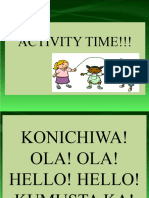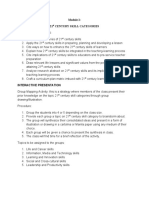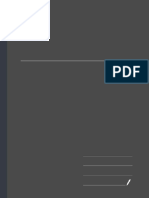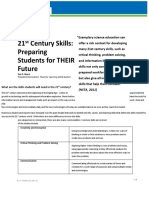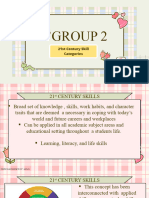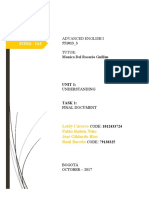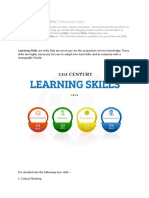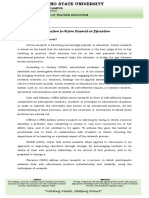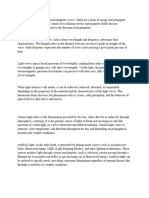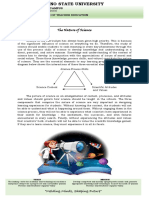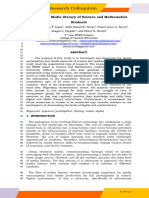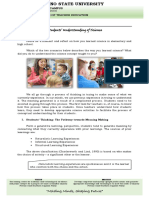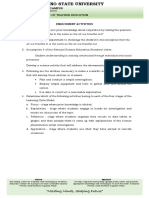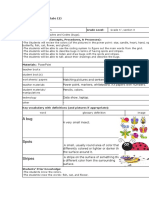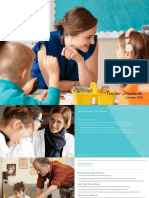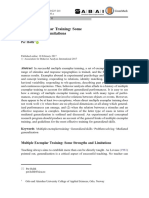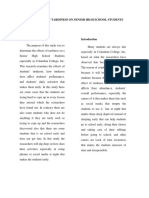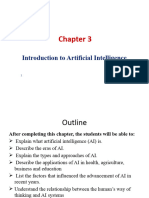Module Week 5 Activity PDF
Uploaded by
Maden betoModule Week 5 Activity PDF
Uploaded by
Maden betoQUIRINO STATE UNIVERSITY
Diffun, Quirino
BACHELOR OF TECHNOLOGY AND LIVELIHOOD EDUCATION
Enrichment Activity
Name: DABU, CRISTHERLYN L. BTLED HE 2A_
EA-Week 5 Deadline for Submission: 4/8/2022
Please Limit the page into 2pages only (Font size=9 Font=Bookman Old Style) Please Submit your
activity in our google Drive. Goodluck! Study Well for your Future!
A. Based from what you have learned from the previous discussion, choose one subcategory for each
category and reflect through describing how you will apply that certain skill in your life. Since there are
three categories, there should also be three reflections
21st century skills are tools that can be universally applied to enhance ways of thinking, learning,
working and living in the world. The skills include critical thinking/reasoning, creativity/creative thinking,
problem solving, metacognition, collaboration, communication and global citizenship.
Education about life skills makes the individual able to improve his knowledge, develop values and
views, meaning that the individual knows when and how to do a task. Life skills motivate healthy
behaviour and increase self-confidence. The 21st century skills focus on the knowledge acquisition,
deepening and creation. In broader term, it covers the “4 C’s” of Creativity, Critical thinking,
Communication, Collaboration, digital age literacy and others. These skills are sometimes also known as
higher-order skills. In the 20th century education, teachers are considered the centre of attention and
provider of information, but in the digital age (21st century education), teachers are now considered as
facilitator or coach that helps students to assess and process information by using technology. Therefore,
teaching young children today is an increasingly challenging task. In the face of these challenges, the
introduction of information and communications technologies (ICT) into schools has come to be seen as a
unique opportunity. ICT offers simulations and multimedia-rich learning environment that improve student
learning and increase the efficiency of the education system. Teachers of 21st century will need to be experts
and have expertise in teaching the same 21st century skills that they are encouraging their students to excel
in. In view of that, besides expert in the content knowledge, teachers must be also equipped themselves with
the latest technological and pedagogical skills.
Rubrics in Rating the Reflections
“Molding Minds, Shaping
Prepared by: MISS MARY GRACE L. SADANG, MIT
Future.”
This study source was downloaded by 100000818497268 from CourseHero.com on 04-09-2022 03:48:01 GMT -05:00
1
https://www.coursehero.com/file/141042404/Module-Week-5-Activitypdf/
QUIRINO STATE UNIVERSITY
Diffun, Quirino
BACHELOR OF TECHNOLOGY AND LIVELIHOOD EDUCATION
“Molding Minds, Shaping
Prepared by: MISS MARY GRACE L. SADANG, MIT
Future.”
This study source was downloaded by 100000818497268 from CourseHero.com on 04-09-2022 03:48:01 GMT -05:00
2
https://www.coursehero.com/file/141042404/Module-Week-5-Activitypdf/
Powered by TCPDF (www.tcpdf.org)




